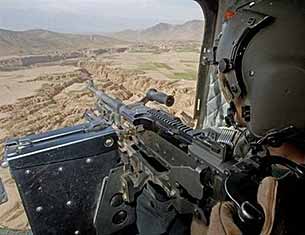20.09.2008
September 16, 2008 (the date of publication in Russian)
Dmitry Sergeyev
INCOMPLIANCE WITH AMPUTATION
The Pakistani army is going to resist to the US scenario of the country's partition
 Last week's developments, indicative of Washington’s commitment to "write off" Pakistan as a strategic ally in Asia and to proceed from military supervision to direct war operations in the country, even without informing the still functioning central government in Islamabad, has understandably irritated the military forces of the destabilized state, which are now ready to fence off US bombings and subversive operations. It is noteworthy that the army is the only strong and reliable element of the Pakistani nation. It is noteworthy that unrest and civil clashes have erupted in this country mostly under the rule of civil governments.
Last week's developments, indicative of Washington’s commitment to "write off" Pakistan as a strategic ally in Asia and to proceed from military supervision to direct war operations in the country, even without informing the still functioning central government in Islamabad, has understandably irritated the military forces of the destabilized state, which are now ready to fence off US bombings and subversive operations. It is noteworthy that the army is the only strong and reliable element of the Pakistani nation. It is noteworthy that unrest and civil clashes have erupted in this country mostly under the rule of civil governments.
A new aggressive operation of US forces in South Waziristan, victimizing twenty civilians, encountered armed resistance from regular troops. The Pakistani soldiers opened fire on US helicopters, forcing them to escape from the airspace of the Islamic republic.
The silence of the officials confirmed that the clash reflected an independent and open expression of disloyalty of the military not only towards US invaders but also towards the factionalized civilian establishment.
The news about the successful counterattack was broadcasted by the National Security Service. The statement saying that Pakistan "is not going to allow foreign troops to intervene a sovereign and integral country" and "will resisted at any price", is made by General Ashfaq Kiani, head of the Infantry's Staff.
The words "at any price" unambiguously refer to the Pakistani nuclear missile potential. The general may have said too much – as compared to President Asif Ali Zardari (a close friend of US Ambassador Zalmay Khalilzad), who even failed to utter "I will order to shoot if you approach".
What will the Pakistani army do in case the US military try to implement the scenario of the country's partition, exposed in 2006 on the notorious Lt. Col. Ralph Peters' maps, where the territory of the largest Islamic country is reduced to the borders of Sindh and Punjab, while the whole North-Western province is merged into Afghanistan and Baluchistan is carved out into an independent entity?
The answer to this question largely depends on the adjacent China which is now implementing a strategic project in Guadar, Baluchistan, encouraged by the now former President Pervez Musharraf. The new international port, designed and co-financed by Chinese companies, is going to play the role of an indispensable trade link between Iran and China. Iranian oil, delivered to the terminal, is supposed to be transported from here to Xinjiang by land. Mass media spread a rumor that the project involves also construction of a Navy base. In case Islamabad allows Chinese Navy to concentrate in this area, the strategic axis of Beijing, Islamabad and Tehran would become a reality.
Naturally, Beijing is uninterested in transformation of Baluchistan into a US-managed puppet state. Judging upon the coverage of the clash between US and Pakistani troops in Chinese media, Bejing is likely to provide support to the Pakistani military against the possible US occupation.
The further development of the situation will be determined by a number of circumstances. One of them is the possibility of the US military assault on Iran. In case it happens, Pakistan may be left to itself. In case the war against Iran is regarded inexpedient, the efforts of US strategists will be focused on Pakistan with fairly predictable consequences.
Number of shows: 1624
 ENG
ENG 

 ENG
ENG 
